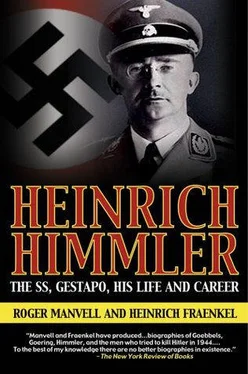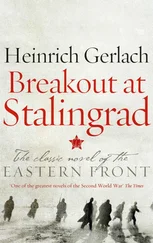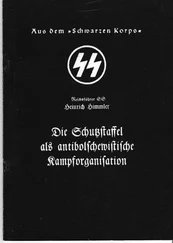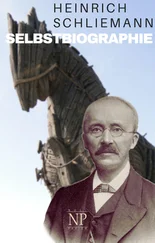Himmler therefore did not qualify as an officer in time to serve on the Western Front, but continued what military activities he could after the Armistice in 1918. It is clear that in spite of his weak health soldiering appealed to him, but meanwhile during the difficult post-war years — Bavaria had for a while a Communist state government during 1919, and the effects of inflation were soon to be felt — he had to qualify for some civilian occupation. It was then that he decided to study farming. By the time he resumed his diary more fully in August 1919, he was already working on a farm near Ingolstadt, a small town on the Danube to which the family were to move from Landshut during September, when Professor Himmler took up a post as headmaster.
Himmler’s work as an apprentice farmer was not to last long; on 4 September he suddenly felt ill. At the hospital in Ingolstadt it was found he had paratyphoid fever. When he recovered he was told he must leave the farm for at least a year, and on 18 October he was accepted as a student in agriculture at the University of Munich. The diary also makes it clear that for the time being he had to give up his hopes of serving as a reservist either in the Army or in the Free Corps movement. He managed, however, to join the traditional student fencing fraternity.
Himmler was to remain a student in Munich until August 1922, when at the age of twenty-one he gained his agricultural diploma. What remains of his diary during this three-year period shows that he was anxious to live the life of the conventional student, persistently seeking out fencing partners until he had received the traditional cut in the face during his last term at college, and making enthusiastic friendships which enabled him to indulge in earnest intellectual discussions. He also believed in enjoying himself, and he even learned dancing in his youthful determination to become a social success. He found the dancing lessons troublesome: ‘I’ll be glad once I know it’, he writes on 25 November. ‘This dancing course leaves me absolutely cold and only takes up my time.’
He lived in rooms where no food was provided, and he took his meals at the house of a certain Frau Loritz, who had two daughters, Maja and Käthe. Although he went home frequently at weekends, and remained on close terms with his brother Gebhard, he soon fell in love with Maja in Munich. ‘I am so happy to be able to call this wonderful girl my friend’, he writes in October, and again the following month: ‘had a long talk with her about religion. She told me a great deal about her life. I think I have found in her a sister.’ Some of his entries are enigmatic: ‘we talked and sang a little. It gives one plenty to think about later.’ But apparently this slight love affair soon drifted into an unimpassioned friendship, even though in November he ‘talked to Maja about relations between man and woman’, and after a discussion on hypnotism he claims to himself that he has considerable influence over her.
It was, apparently, an uneasy time for him. He was restless, and dreamed of leaving Germany eventually and working abroad. Though he often had to work in the evenings, he began to study Russian in case his future travels took him east. His closest friend, apart from his brother Gebhard, was a young man called Ludwig Zahler, a companion from his days in the Army, with whom he talked endlessly, but whose character evidently disturbed him. ‘Ludwig seems to me more and more incomprehensible’, he writes, and then two days later, ‘I have now no more doubts about his character. I pity him.’
He shows that he also had some doubts about himself. ‘I was very earnest and depressed’, he records in November, after an evening with Maja. ‘I think we are heading for serious times. I look forward to wearing uniform again.’ Less than a week later he confesses to himself, ‘I am not quite sure what I am working for, not at the moment at any rate. I work because it is my duty. I work because I find peace of mind in working … and overcome my indecision.’
At the time he was writing these entries at odd moments in his diary, Himmler was only nineteen, but already he reveals qualities in his nature which were to remain unchanged throughout his life. Although he enjoys a narrow social life with a small circle of friends, he instinctively avoids any human relationship that commits him too deeply. The force that drives him is what he believes to be his duty, and this leads him to work hard at his studies, and force his unhealthy body to succeed in the accepted exercises, such as swimming, skating and, above all, fencing. His conventionalism becomes in itself a kind of passion; he is gregarious without any real warmth, and he is only prepared to seek the companionship of girls on the understanding no passion enters into his relationship with them. He still attends Mass, and, in his spare time, practises shooting with Gebhard and Ludwig against the future when he can, once more, ‘wear uniform’. He is an ardent nationalist in politics, and seriously alarmed by events in the east.
The diaries lapse again between February 1920 and November 1921, and again between July 1922 and February 1924. The final phase of his life as a student followed much the same pattern, broken by minor military exercises as a reservist and clerical duties for a student organization known as Allgemeiner Studenten Ausschuss. His ambition to farm in the east has, however, changed; he considers Turkey now to be more suitable, and he travelled to Gmund, where he was later to establish his lakeside home on the Tegernsee, to meet a man who knew something of the prospects in Turkey. He is, however, still uncertain about his own character. In November 1921, in his twenty-second year, he writes: ‘I still lack to a considerable degree that naturally superior kind of manner (die vornehme Sicherheit des Benehmens) that I would dearly like to possess.’
His relations with girls are still platonic. He mentions meeting a girl from Hamburg on the train, and remarks in his diary that she was ‘sweet and obviously innocent and very interested in Bavaria and King Ludwig II’. His friend Ludwig, who worked in a bank, tells him that Käthe thinks he despises women, and Himmler says she is right. Then he adds:
‘A real man will love a woman in three ways: first, as a dear child who must be admonished, perhaps even punished, when she is foolish, though she must also be protected and looked after because she is so weak; secondly, he will love her as his wife and loyal comrade, who helps him fight in the struggle of life, always at his side but never dampening his spirit. Thirdly, he will love her as the wife whose feet he longs to kiss and who gives him the strength never to falter even in the worst strife, the strength she gives him thanks to her childlike purity.’
Although he mentions many girls in his diary, it is with increasing primness and resistance. He still attends church, and he moralizes after eating in a restaurant on how the beauty of the waitress will inevitably lead to her moral downfall and how, if he had the means, he would love to give her money to prevent her from going astray. He mentions a coolness, even a breach, in his relations with Frau Loritz and Käthe, whose ‘feminine vanity’ he considers a waste of his precious time. In May 1922 he notes in the diary how shocked he had been to see a little girl of three permitted by her parents to ‘hop round in the nude’ before his shocked gaze. ‘She ought at that age’, he says, ‘to be taught a sense of shame.’
The recollections of certain fellow students complete the portrait of Himmler in his youth that his diaries contain. 5He is remembered as being meticulous in his studies and awkward in his social relationships. He wore his rimless pince-nez even when duelling, he recited Bavarian folk poetry rather badly, he avoided association with girls except those who expected to be treated with formality and politeness, and he never made love like his fellow students where love was to be found. He told his brother Gebhard he was determined to remain chaste until marriage, however much he might be tempted. Yet he was socially ambitious, putting himself forward as a candidate for various student offices for which he seldom received more than an unflatteringly small number of votes. The student society in which he tried most to shine was the Apollo club, which had a cultured rather than a sporting or merely beer-swilling membership. The members of Apollo were mostly ex-service men and senior graduates, and the president of the society at that time was a Jew, Dr Abraham Ofner. Although Himmler, a junior member of Apollo, was studiously polite to Dr Ofner and the other Jewish members, he was already strongly anti-Semitic in feeling, and he joined in violent discussions as to whether Jews should not be excluded from the society. In politics he is remembered as inflexibly right-wing, a natural if not very efficient member of the Free Corps formed to oppose the Communist infiltration into post-war Bavarian administration. We are left with a picture of a small man, prosaic and platitudinous, concealing his shyness under a certain arrogance. He disguised his fear of seeming unable to fulfil the hot-blooded life of a student by displaying excessive diligence in his work and making it quite clear he was determined to take part in the various right-wing, militaristic movements of that unsettled time. His exactness of habit seems to amount to a mania, for he never ceases to record when he shaves, when he has his hair cut, even when he has a bath. All these experiences take their due place alongside the duelling and the military exercises, and the serious discussions of religion, sex and politics. He notes down the comparative beauty of his dancing partners with exactly the same calm, meticulous cataloguing that he shows when he notes the cutting of his hair or the shaving of his beard:
Читать дальше











